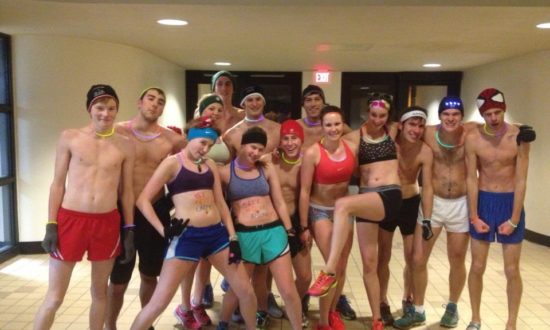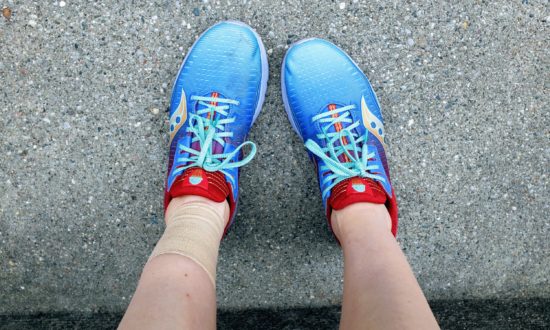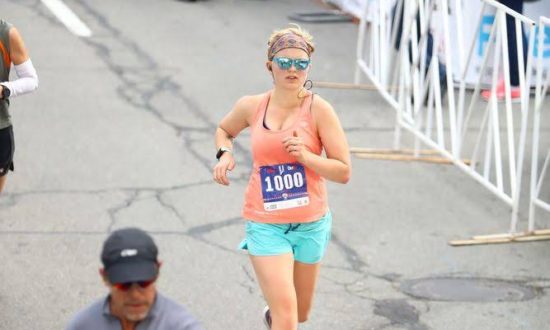I am no longer a trail marathon virgin.

On Saturday, I finished the Hurt the Dirt Marathon, my first trail marathon (also my first marathon in two years, which gives me an identity crisis if I think about it too much). So now I am a trail marathon expert. You may ask me all the questions.

Yeah, no. But I can tell you with confidence that a marathon on a trail is a whole different beast than your standard road marathon. In case you were ever having a momentary lapse of sanity required to sign up for a marathon and were considering a trail marathon, I’m going to lay out the biggest differences between your standard marathon and one out on the trails.
If you’re ever considering running the Hurt the Dirt Marathon in Rockford, Michigan, I’ve also laid out the pros and cons of that race so you can decide if it sounds like the perfect way to spend a free Saturday in April. Check out the post here.
Support comes from fellow runners, not crowds.
You’re going to be out in the middle of the woods. Some brave/bored spectators may trudge through the forest to cheer you on, but don’t expect any crowds or yelling strangers waving beautiful homemade motivational signs. Don’t worry, though, you’re not totally alone out there. Since music is usually discouraged during trail races and you have to get a runner’s attention before passing them, your biggest cheerleaders will be those going through it with you.
Focus is on footing, not on pace.
Runners typically don’t have a PR in mind during a trail race. The race is hilly and the route is winding, not exactly the best conditions for setting a personal record. Also, every mile is so unique. Unless the trail you’re on is flat and smooth, keeping a consistent pace mile after mile might just drive you crazy. Besides, you’re Garmin will probably be super off anyway. Instead, you’ll probably find yourself focusing on what’s below your feet instead of what number is on your watch. Roots, sticks, and rocks require fancy footwork and constant vigilance. You may actually find the whole shift in perspective a bit refreshing, letting you actually feel the run instead of just monitor it.
You’ll be sore in new and exciting ways.
There will be roots to hurdle, hills to scale, and slopes to scramble down. A trail marathon isn’t just the same repetitive movement for 138,435 feet. You are going to be using every muscle you have at some point to avoid falling on your face or crawling up a hill. If you’re one of those weirdos who loves feeling sore after a race (hey, nice to meet you! I’m a weirdo too), you are going to love the soreness post trail marathon. Your hips, your abs, your calves, your quads (of course), your arms… EVERYTHING. It’s great.
Distance is measured less in miles, more in terrain.
Since your Garmin will most likely be off and it’s not guaranteed there will be mile markers on the course, you will probably end up developing your own way of marking the distance, especially if your race involves running the same lap several times. Unlike a typical marathon were your surroundings may change from mile to mile, the literal terrain you are running on frequently changes during a trail marathon. You’ll start to tell yourself that “the sandy part” is coming up or the “part with the bridge.” These distance markers will be so wonderfully arbitrary that it will help make the time go by faster while keeping the experience memorable.
There’s less of a celebrity factor, but it’s not a bad thing.
Sometimes running a marathon feels like the whole city has shut down to celebrate you. People trying to get to work might feel differently, but there’s something huge and awe-inspiring of running down city streets while bystanders cheer you on. Sometimes, you feel like more of a celebrity than a runner. A trail race has a much different feel. You are out there to prove something to yourself, no one else. No spectator is going to see your struggle, there probably won’t be too many photographers or volunteers to guide you through the finish chute. Out there, it’s just you and the trees and the trail and that voice in your head telling you not to give up. All the flash and pizzaz is gone, but the wonder and raw accomplishment remain. On the trail, you are forced to reconnect with yourself as a runner, as a marathoner. And when you cross that finish line with dirt on your hands and knees to a small chorus of cheers, you’ll hear your own inner voice cheering the loudest of all.




